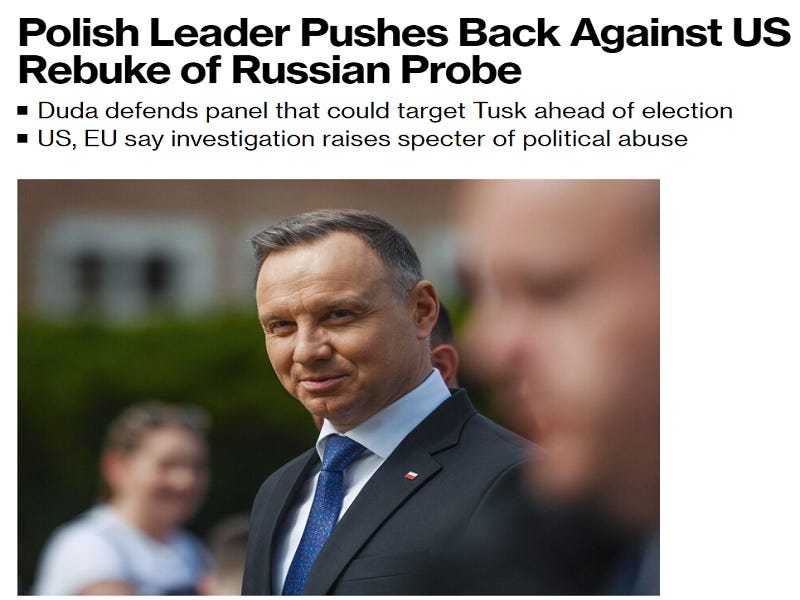It Was Predictable That The West Would Condemn Poland’s “Russian Influence Commission”
The ruling party miscalculated by expecting that the leading role that they carved out for Poland in the NATO-Russian proxy war would shield them from Western criticism for persecuting the liberal-globalist opposition.
Russiagate conspiracy theories have been all the rage in the West since the start of Moscow’s special operation 15 months ago, which is why casual observers might have been surprised by the US and EU condemning Poland for its recent creation a “Russian influence commission”. This unprecedentedly powerful body will investigate alleged Russian influence in the country from 2007-2022 and can ban people from office who are found to have contributed to this.
The timing of this development just months before fall’s next elections and the fears that it could be exploited to knock “Civic Platform” (PO) opposition leader Donald Tusk out of the race, which would be especially scandalous due to him previously serving as Poland’s Prime Minister and European Council President, prompted criticism from the US and EU. This took Polish President Andrzej Duda off guard, who remarked in a recent interview that “I don’t quite understand the reaction of our allies.”
It was predictable that the West would condemn Poland’s “Russian influence commission”, however, since this de facto New Cold War bloc is run by liberal-globalists who hate even faux conservative-nationalists like Poland’s ruling “Law & Justice” (PiS) party. Their scorn for PiS was responsible for them attacking its policies against abortion, illegal immigrants, and LGBT, not to mention their prior pressure campaign aimed at getting the country to make judicial concessions at the expense of its sovereignty.
All this went away in an instant the moment that Russia’s special operation began and Poland positioned itself as NATO’s vanguard for waging the resultant proxy war in Ukraine, which PiS was eager to fight since it sought to revive their country’s long-lost commonwealth throughout the course of this conflict. That grand strategic goal led to Poland fiercely competing with Germany for leadership over Central & Eastern Europe, the struggle of which will continue as long as PiS remains in power.
Germany always backed PO due to their shared liberal-globalist ideology, but now Berlin has more of a reason than ever to support regime change in Warsaw after PiS decided to challenge its influence in the eastern half of the EU. The US supports these faux conservative-nationalists’ geopolitical plans since it regards them as driving a wedge between Germany and Russia, thus making it all the more difficult for those two to ever enter into a rapprochement.
Nevertheless, American policymakers would prefer for the entire EU to be ruled by fellow liberal-globalists, even if it means that Poland is unable to fulfill its abovementioned geopolitical plans in the event that PO ousts PiS and turns that country into a German proxy. The US and Germany both know that PiS is exploiting the West’s anti-Russian zeitgeist via its newly formed “Russian influence commission” in order to ensure that it retains its electoral edge over PO ahead of this fall’s vote.
This explains why they’re criticizing the creation of this same commission that each would support if the other established their own. The only difference is that PiS is setting this up to persecute the liberal-globalist opposition while the US and Germany would do this to persecute their conservative-nationalist oppositions. They aren’t going to remain silent as their Polish ideological allies risk being banned from the next election despite it being “politically incorrect” right now to criticize anti-Russian witch hunts.
PiS miscalculated by expecting that the leading role that they carved out for Poland in the NATO-Russian proxy war would shield them from Western criticism for persecuting the liberal-globalist opposition. These faux conservative-nationalists are learning the hard way that this de facto New Cold War bloc will always rally in support of its rulers’ ideological allies. If the “Russian influence commission” bans Tusk from running in this fall’s election, then there’s a chance that the US and EU won’t recognize the results.


